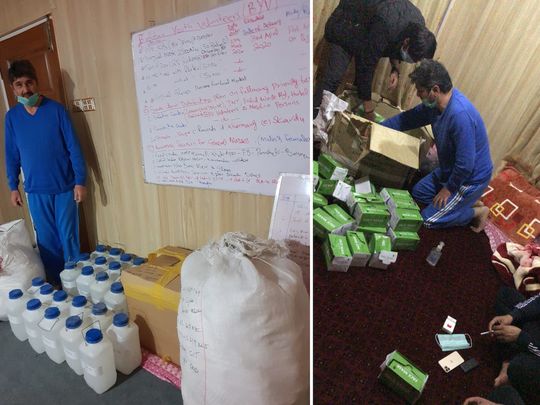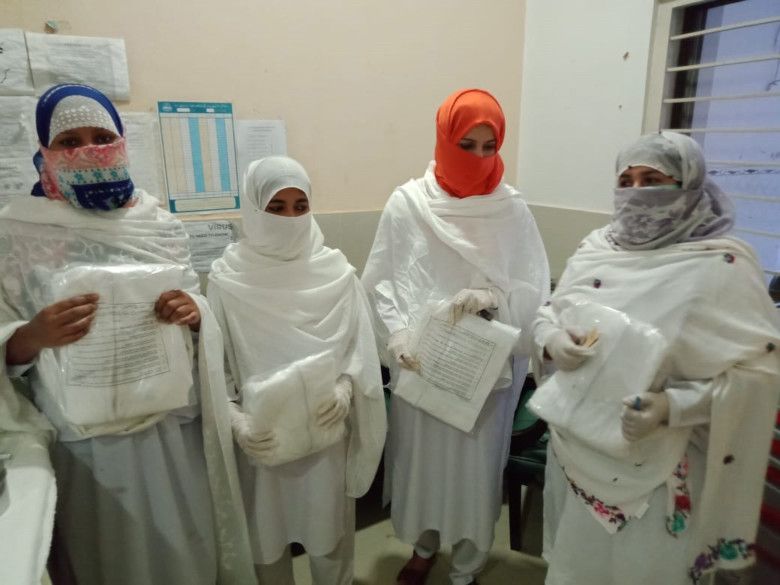
Islamabad: Two Pakistani individuals are mobilising efforts to protect front line health care workers amid coronavirus outbreak. As of April 13, at least 5,374 cases of coronavirus have been reported in Pakistan, and 93 deaths. At least 1095 patients have recovered.
Dr Fuad Hameed Rai and Dr Mahliqa Maqsud — Lahore-based doctors — teamed up to help the medical community after pleas for protective equipment by medical staff. They immediately decided to source masks and protective suits, out of their own pockets, to help fill the gaps left by the government. Later their friends joined hands in supporting them to continue the mission.
“More than 1,500 hazmat suits have been distributed free of cost in Punjab, Khyber Pakhtunkhwa, Baluchistan and Gilgit Baltistan in addition to surgical masks, gloves, hundreds of litres of sanitisers and disinfectants, during the last two weeks,” Dr Fuad told Gulf News. Being doctors, they utilised their social network to identify the critical equipment needs at the hospital.
“On Saturday (April 11), with the help of a friend, Lavangeen Wali Khan, we donated nearly 100 protective suits to Hayatabad Medical Complex Peshawar and some 105 suits to Lady Reading and Khyber Teaching Hospital Peshawar.”
They have donated the essential medical supplies in several hospitals and quarantine facilities in Lahore, Peshawar, Skardu, Quetta, Mardan, Charsadda, Dera Ghazi Khan, Gujrat, Sialkot, Mandi Bahauddin, and in districts including Bahawalpur, Sargodha, Attock, Okara, Rajanpur. They are constantly expanding their reach. “We want to first protect our medical workers so that they can save lives. So, we bought whatever we could and are delivering it as soon as we can” amid the partial lockdown and reduced mobility. “The supplies sent to Skardu through a friend Kacho Imtiaz Khan were described as the largest donation arranged by individuals.”
‘Hazmat suit is a doctor’s protective armour’
The two dedicated volunteers are donating the most critical medical gear — Personal protective equipment (PPE) that includes masks, gloves and other clothing to prevent the spread of coronavirus. For many doctors, the epidemic is a battle they are fighting and the hazmat suits are critical to win the battle. “You can’t expect them to go and fight the virus without providing them the gear. It’s like sending them to war without protective armour” says Dr Fuad.
The hazmat suit is plastic outer layer with a hooded coverall, overtaxed seams and self-adhesive zipper. The suit and masks are certified for one-time use only but hospitals around the world are now experimenting to reuse it more than once by the same doctor amid the dire shortage. “If the suit, used in a non-risk area, is properly removed and there is no tear, you may reuse it after getting it washed in a disinfectant solution and sterilise it with UV machines that the hospital uses to disinfect rooms” suggests Dr Fuad.
Helping those who protect us from the virus
The idea is to “help those in the community who are putting their lives at risk to protect us all from the virus,” says Dr Mahliqa, a gynecologist at King Edward Medical University. Ever since they coordinated effort, their phones keep lighting up at all hours with messages of gratitude from doctors and request to keep the hazmat suits coming. The group is one of numerous organisations and individuals that have emerged across Pakistan to help those severely affected by the Covid-19 pandemic.

Efforts by the government
“Although the government is providing the medical supplies but the hospital staff doesn’t have enough.” Pakistan has around 1,279 public hospitals and 220,829 registered doctors for a population of nearly 210 million, according to Pakistan’s Economic Survey 2018-2019. This means there is one doctor available for every 963 people and one hospital bed for 1,608 people.
Pakistan government is continually ramping up efforts to bring in medical supplies from abroad and also producing locally. Pakistan’s National Disaster Management Authority (NDMA) has distributed nearly 73,000 PPEs, 1.7 million surgical masks, 75,000 N95 masks, 10,000 face shields, 650,000 gloves and 137,000 surgical caps, as of April 11.








